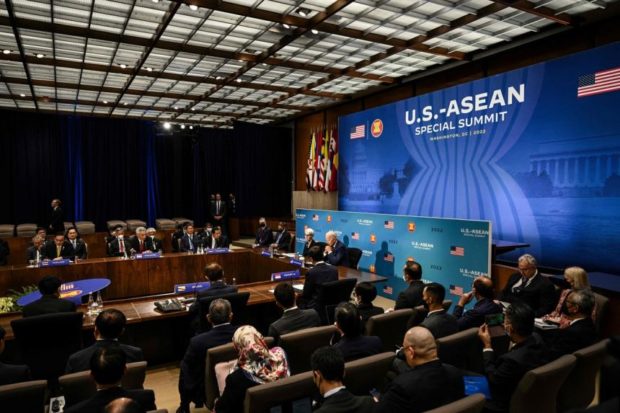
US President Joe Biden meeting with Asean leaders at the US-Asean special summit in Washington DC on May 13, 2022. PHOTO: AFP
WASHINGTON – The United States and Asean ended their summit in Washington on Friday (May 13) with an agreement to work on upgrading their ties to a comprehensive strategic partnership in November, following similar agreements Asean made with Australia and China late last year.
The elevated partnership will be “meaningful, substantive and mutually beneficial”, they said in a joint statement at the end of two days of meetings in Washington to mark 45 years of ties.
“We are not only celebrating 45 years of partnership and friendship between Asean and the United States; we are launching a new era of US and Asean relations,” US President Joe Biden said at the summit’s afternoon session on Friday.
Singapore Prime Minister Lee Hsien Loong said the summit and the upgrading of ties are a signal that the US values its partnership with Asean and would like to engage more with the region.
The US also moved to fill the position of US ambassador to Asean, a post that has been vacant since the start of the Trump administration in January 2017 to the consternation of regional watchers.
On Friday, Mr Biden announced that he was nominating National Security Council chief of staff and executive secretary Yohannes Abraham, a move that was welcomed by South-east Asian leaders.
Washington sought to underscore its “enduring commitment” to the region at the summit, rolling out US$150 million (S$209 million) worth of programmes in clean energy, maritime cooperation, public health and education.
Mr Biden said that Washington’s enthusiasm for engagement in the region was reflected across his entire administration, noting that the US and Asean’s discussions had ranged from combating the Covid-19 pandemic and climate change to building sustainable, quality infrastructure.
“The breadth of our discussions reflects just how vital the Indo-Pacific and Asean regions are to the United States of America,” said Mr Biden. “A great deal of the history of our world for the next 50 years is going to be written in the Asean countries.”
PM Lee said the summit was meaningful given Russia’s invasion of Ukraine, the ongoing pandemic, and tensions between the US and China.
“In the midst of all this, for the US to focus on Asean and to bring the Asean leaders here and cultivate that relationship and develop it further, I think it shows that the US values its partnership with Asean, South-east Asia, and that they would like to do more with us,” he told Singapore reporters in an interview.
He added: “The US continues to be focused on the Asia-Pacific, even despite all its other many busy preoccupations. That is good for us because Singapore’s view has been for a long time that the US plays a constructive, in fact, indispensable, role in our region.
“Nobody else can replace them in that role and the regional balance is shifting but all the more, we appreciate the US continuing to remain engaged.”
PM Lee said the Indo-Pacific Economic Framework (IPEF), America’s upcoming economic strategy for the region, was also discussed at the summit.
Quite a number of Asean countries are interested in the framework and some of them will take part in it when it is launched, he said, adding that Singapore supports the economic plan.
“US participation in the Asia-Pacific cannot be only limited to security and defence. It must also consist of economic cooperation, and also include other areas such as on environmental issues,” he said.
PM Lee acknowledged the domestic political realities that prevent the US from rejoining what was initially the Trans-Pacific Partnership, which Washington pulled out of in January 2017, and called the IPEF an “alternative construct”.
“In terms of investment and trade, there is not much substance yet, but looking at it from another angle, it has its own value. It is, after all, a new start. Although the US is not ready to participate in trade or investment cooperation, hopefully with the IPEF, we will be able to work from there and eventually restore economic cooperation fully,” he said.
China, with which the US is competing for influence in the region, was barely mentioned at the summit and not at all in the joint statement.
The US and Asean, however, stressed the benefits of having the South China Sea – which the US has criticised China for increasingly asserting its claims over in contravention of international law – “as a sea of peace, stability and prosperity”.
They also reaffirmed the need to pursue peaceful resolution of disputes in accordance with universally recognised principles of international law.
Mr Biden stressed that the US was “committed to a future where the rules and norms that have made possible so much growth and prosperity and stability in the Indo-Pacific are upheld and strengthened, including respect for the rule of law and for human rights”.
US Vice-President Kamala Harris echoed the sentiment earlier, telling Asean leaders at a working lunch that the US would remain in the region for generations to come and stressing the importance of ensuring free and open shipping lanes.
The military coup in Myanmar and ongoing war in Ukraine were also among the global and regional issues discussed.
RELATED STORIES
With China in focus, Biden plans $150 million commitment to ASEAN leaders
Locsin to attend US-Asean special summit
Biden seeks to keep China in focus by welcoming ASEAN leaders
As Ukraine war rages, Biden team revives Asia focus